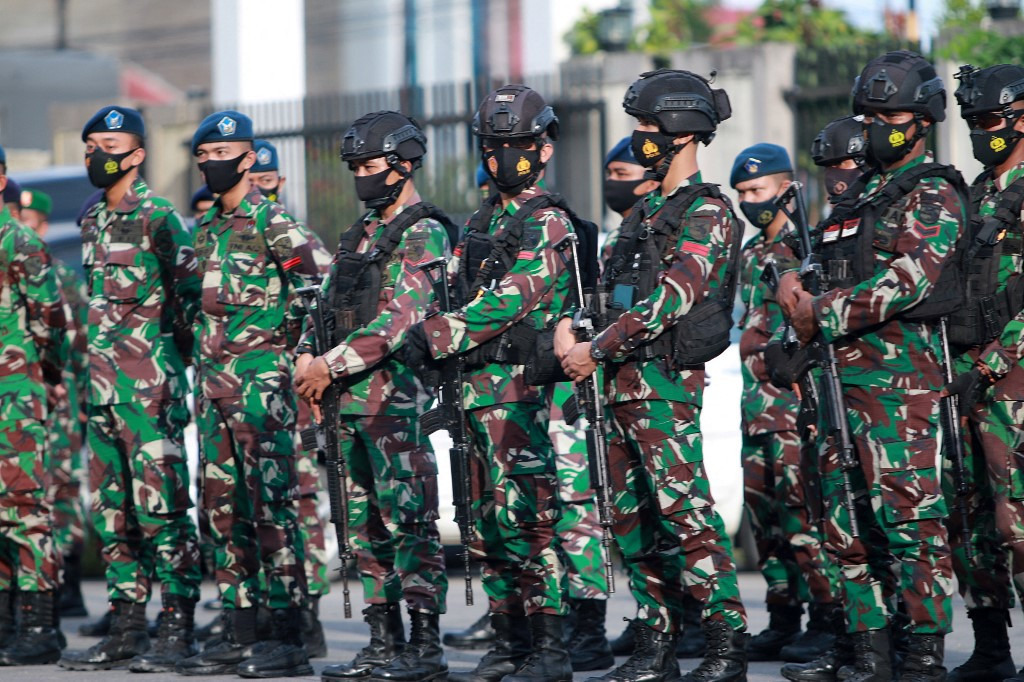Popular Reads
Top Results
Can't find what you're looking for?
View all search resultsPopular Reads
Top Results
Can't find what you're looking for?
View all search resultsMilitary involvement necessary in Indonesia’s COVID-19 response: President's office
Activists and critics are concerned about the increasing role of the military in the country's pandemic response, particularly in the second year of the health crisis.
Change text size
Gift Premium Articles
to Anyone
T
he Executive Office of the President's undersecretary on human development, Abetnego Tarigan, said the Indonesian Military's (TNI) involvement was necessary and vital in the country's COVID-19 response, as calls to reduce military roles in civilian affairs grew from activists.
Abetnego said TNI roles in the distribution of vaccine supplies and medical equipment remained critical, particularly in ensuring equal distribution of vaccines to remote regions across the vast archipelago.
"The TNI has the necessary resources, established networks and facilities across the country to deliver the [vaccines] in a timely manner, and the government does not have to spend a lot of money and time to recruit new workers," he said in a virtual public discussion last week.
He added that the deployment of military medical personnel to vaccinate the public had also helped improve vaccination rates, particularly in regions that suffered vaccine shortages due to political differences. Without naming the regions, he said many provincial administrations had refused to distribute vaccines to certain regencies or cities because they shared different political views.
And because Indonesians often disregarded health rules, military intervention was necessary and important to ensure the public followed protocols, he said.
He cited as an example the millions of people who still went on mudik (exodus) during the Idul Fitri holiday season despite a government ban. The poor public compliance with COVID-19 curbs became a catalyst for the ensuing surge of infections that has devastated Indonesia for the past several months.
Activists and critics, including from independent data initiative LaporCOVID-19 and the Indonesian Legal Aid Foundation (YLBHI), are concerned about the increasing role of the military in the country's pandemic response, particularly in the second year of the health crisis.
Read also: Jokowi’s upward trust on generals in COVID-19 response
Firdaus Ferdiansyah from Lapor COVID-19 said one prominent example was the appointment of Coordinating Maritime Affairs and Investment Minister Luhut Binsar Pandjaitan, an ex-military general who remains a powerful political figure, to lead the implementation of multitiered public activity restrictions (PPKM) in Java and Bali.
Luhut was widely regarded as President Joko “Jokowi” Widodo’s right hand and troubleshooter during Indonesia’s COVID-19 health crisis, with the President appointing him as a temporary replacement of the transportation minister who contracted COVID-19, as well as the former social affairs minister who was entangled in corruption cases. Besides leading the implementation of PPKM measures in Java and Bali, Luhut is also the deputy of the National Economic and COVID-19 Recovery Committee (KCP-PEN).
In the early days of the pandemic in March last year, Jokowi appointed then-National Disaster Mitigation Agency (BNPB) head Doni Monardo, who at the time was an active Army general unlike his predecessor, to lead the national COVID-19 task force. Doni, who retired from the BNPB in June of this year, was replaced by Ganip Warsito, at the time also an active military general.
"The trend was apparent in Jokowi’s decisions since the start of the pandemic,” Firdaus said.
Read also: Jakarta military commander tapped as COVID-19 emergency hospital head
He added that military involvement in the country’s COVID-19 handling deepened as the pandemic continued, with soldiers recently deployed to trace the close contacts of coronavirus patients, administer vaccines and enforce health protocols.
LaporCOVID-19 has received reports that some TNI personnel had used violence to punish PPKM violators, including through beatings.
“Repressive approaches would only reduce public trust in the government and deter people from actively participating in efforts to slow down transmission,” Firdaus said. “The government must use a more democratic approach that is also based on scientific evidence to handle the health crisis and reduce the military's involvement.”
Read also: Pandemic tests Jokowi’s grip on ruling coalition
Earlier activists said that the government's decision to deploy military personnel to carry out vaccination drives had backfired in several regions, including in Papua, Indonesia's restive easternmost province where basic infrastructure remains lacking.
A rights activist in Papua, Ambrosius Mulait, said one of the main reasons for the sluggish vaccination rollout in the province was because the public was afraid to come to vaccination centers run by military personnel, according to local media reports last month. Ambrosius said locals had been traumatized by alleged extrajudicial killings carried out by security forces in the region in the past, while some believed that the vaccine was just another way for the government to kill Papuans.
The government is trying to accelerate vaccination in Papua in preparation for the 20th National Games (PON) in Jayapura in October. It aims to inoculate 70 percent of residents around the venues, but only 40 percent of the population there has received the first dose of the vaccine.










